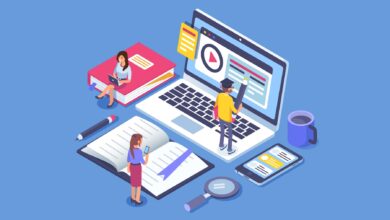The Power of Adaptive Learning: Personalized Education for All

Personalized Education, Education is a fundamental pillar of human development, and in today’s digital age, technology has revolutionized the way we learn. Adaptive learning, a groundbreaking approach to education, has emerged as a powerful tool in providing personalized education for all learners. By harnessing the capabilities of artificial intelligence (AI), adaptive learning adapts the learning experience to individual learners, catering to their unique needs, abilities, and interests. In this article, we will explore the concept of adaptive learning, its benefits, and its potential to transform education.
Adaptive learning is an educational method that utilizes technology and data analytics to personalize the learning experience. It leverages AI algorithms to dynamically adjust the learning path, content delivery, and assessments based on each learner’s strengths, weaknesses, and progress. By continuously analyzing data, adaptive learning systems can provide tailored instruction that optimizes learning outcomes.
Read More: 7 Importance of Soft Skills in Modern Education
How Adaptive Learning Works
Personalized Education, At the core of adaptive learning is the collection and analysis of data. When a learner interacts with an adaptive learning platform, the system gathers information about their performance, preferences, and learning patterns. This data is then processed by AI algorithms that identify areas of strength and areas that require further focus. The system then adapts the learning experience by presenting content, activities, and assessments that are most relevant to the learner’s needs.

Benefits of Adaptive Learning
Personalized Education, Adaptive learning offers several benefits that contribute to its growing popularity in education:
- Individualized Learning Paths: Adaptive learning allows learners to progress at their own pace, ensuring they receive the right level of challenge and support.
- Customized Content Delivery: By tailoring the content to each learner’s needs and interests, adaptive learning makes the educational material more engaging and relevant.
- Adaptive Assessments: Adaptive assessments provide immediate feedback, enabling learners to identify their areas of improvement and focus on specific concepts or skills.
- Progress Monitoring and Feedback: Adaptive learning systems continuously monitor learners’ progress, providing real-time feedback to learners, teachers, and parents.
Personalized Education: Tailoring Learning Experiences
Personalized Education, In traditional education models, teachers often face the challenge of catering to the diverse needs of their students. Adaptive learning overcomes this challenge by personalizing the learning experience in various ways.
Individualized Learning Paths
Personalized Education, Adaptive learning platforms create individualized learning paths for each learner. Instead of following a one-size-fits-all curriculum, learners can progress through the material at their own pace, ensuring mastery of concepts before moving on. This personalized approach fosters a deeper understanding of the subject matter and enhances the overall learning experience.
Customized Content Delivery
Adaptive learning systems deliver content in a format that suits each learner’s preferences and learning style. Visual learners may receive more interactive and visually engaging materials, while auditory learners may benefit from audio-based content. By catering to individual preferences, adaptive learning makes the educational material more accessible and engaging.
Adaptive Assessments
Personalized Education, Traditional assessments often fail to capture a comprehensive picture of a learner’s abilities. Adaptive assessments, on the other hand, dynamically adjust the difficulty of questions based on the learner’s performance. This ensures that learners are appropriately challenged and allows for a more accurate assessment of their skills and knowledge.
Progress Monitoring and Feedback
Adaptive learning systems continuously monitor learners’ progress, providing valuable feedback to learners, teachers, and parents. This feedback enables learners to track their growth, identify areas for improvement, and celebrate their achievements. Teachers can also leverage this data to personalize their instruction further and provide targeted support.
The Impact of Adaptive Learning
Enhanced Student Engagement
One of the significant advantages of adaptive learning is its ability to increase student engagement. By tailoring the learning experience to individual interests and preferences, adaptive learning makes education more interactive, relevant, and enjoyable. Learners become active participants in their own education, leading to higher motivation and sustained engagement.
Improved Learning Outcomes
Adaptive learning has demonstrated its effectiveness in improving learning outcomes. By addressing learners’ unique needs and providing targeted instruction, adaptive learning enhances knowledge retention, critical thinking skills, and problem-solving abilities. Learners develop a deeper understanding of the subject matter and achieve better academic results.
Closing the Achievement Gap
Adaptive learning has the potential to bridge the achievement gap that exists among learners. By providing personalized instruction and support, adaptive learning ensures that all learners, regardless of their background or abilities, have equal opportunities to succeed. This inclusivity and equity in education contribute to a more fair and just society.
Implementing Adaptive Learning in Schools
Integration with Technology
Personalized Education, To implement adaptive learning effectively, schools need to integrate technology into their classrooms. This involves providing learners with access to devices such as tablets or laptops and ensuring reliable internet connectivity. Additionally, schools should invest in adaptive learning software and platforms that align with their curriculum and instructional goals.
Teacher and Student Support
Successful implementation of adaptive learning requires adequate support for both teachers and students. Teachers should receive training to familiarize themselves with the adaptive learning system and understand how to interpret and utilize the data generated. Students, on the other hand, may need guidance in navigating the adaptive learning platform and understanding their personalized learning paths.
Overcoming Challenges
While adaptive learning holds tremendous promise, there are challenges that need to be addressed. Some learners may resist the shift from traditional teaching methods, and teachers may face a learning curve in integrating adaptive learning into their instruction. Moreover, ensuring data privacy and security is crucial to building trust in adaptive learning systems.

Adaptive Learning in Higher Education
Advantages for College and University Students
Personalized Education, Adaptive learning is not limited to K-12 education; it has significant advantages for college and university students as well. Higher education institutions can leverage adaptive learning to personalize instruction, support self-paced learning, and provide additional resources to students who need them. This individualized approach promotes deeper learning and helps students succeed in their academic pursuits.
Preparing for the Workforce
In today’s rapidly evolving job market, adaptive learning prepares students for the workforce by fostering critical skills such as adaptability, problem-solving, and self-directed learning. By customizing learning experiences to align with real-world demands, adaptive learning equips students with the skills necessary for future success.
Lifelong Learning Opportunities
Adaptive learning extends beyond formal education. It offers lifelong learning opportunities for individuals seeking to acquire new knowledge and skills. With adaptive learning, learners can embark on personalized learning journeys tailored to their interests and goals, ensuring continuous growth and development throughout their lives.
Adaptive Learning for Diverse Learners
Catering to Different Learning Styles
Personalized Education, Every learner has unique learning preferences and styles. Adaptive learning recognizes these differences and provides customized content delivery, ensuring that learners receive information in ways that resonate with them. Whether it’s visual, auditory, kinesthetic, or a combination of learning styles, adaptive learning accommodates diverse learners and maximizes their learning potential.
Addressing Learning Disabilities
Adaptive learning has shown promise in supporting learners with learning disabilities. By adapting the learning experience to their specific needs, adaptive learning platforms can provide targeted interventions, accommodations, and assistive technologies. This inclusive approach empowers learners with learning disabilities to overcome challenges and succeed academically.
Inclusion and Accessibility
Adaptive learning promotes inclusion and accessibility in education. By providing personalized support and accommodations, it ensures that learners with disabilities or diverse backgrounds have equal access to education. Adaptive learning platforms can offer features such as text-to-speech, closed captioning, and alternative formats to meet the needs of all learners.
Ethical Considerations and Privacy
As adaptive learning relies on collecting and analyzing learner data, ethical considerations and privacy are of utmost importance. It is crucial to ensure that data is securely stored, and learner privacy is protected. Transparent communication regarding data usage, consent, and opting out should be prioritized to build trust and maintain ethical standards in adaptive learning.
Data Security and Protection
Schools and educational institutions must implement robust data security measures to safeguard learner information. This includes encryption of data, secure storage practices, and adherence to privacy regulations such as the General Data Protection Regulation (GDPR) and the Family Educational Rights and Privacy Act (FERPA). Regular audits and assessments of data security practices are essential to maintaining data integrity.
Balancing Personalization and Privacy
While adaptive learning aims to provide personalized education, it is crucial to strike a balance between personalization and privacy. Learner data should only be used for educational purposes and should not be shared or sold to third parties without explicit consent. Clear policies and guidelines should be established to protect learner privacy while leveraging the benefits of adaptive learning.
Transparent and Ethical Use of Data
Personalized Education, Educational institutions should adopt transparent practices when using learner data. Clear communication with students, parents, and teachers about data collection, analysis, and its impact on the learning experience is essential. Institutions should also prioritize the ethical use of data, ensuring that it is used responsibly and in a manner that benefits learners without perpetuating biases or discrimination.
The Future of Adaptive Learning
Advancements in Artificial Intelligence
As artificial intelligence continues to evolve, so does the potential of adaptive learning. AI algorithms are becoming increasingly sophisticated in analyzing learner data and delivering personalized instruction. Advancements in natural language processing, machine learning, and predictive analytics will further enhance the adaptive learning experience, enabling even more precise tailoring of educational content.
Personalized Education for All
Personalized Education, The future of adaptive learning holds the promise of personalized education for all learners. As technology becomes more accessible and adaptive learning platforms become more refined, personalized education will become the norm rather than the exception. This inclusive approach ensures that every learner has the opportunity to reach their full potential and receive an education that caters to their unique needs.

Personalized Education, Conclusion
Adaptive learning represents a transformative approach to education, harnessing the power of technology and personalization to enhance learning experiences. By tailoring instruction, content delivery, and assessments to individual learners, adaptive learning promotes engagement, improves learning outcomes, and addresses the diverse needs of students. As we embrace the potential of adaptive learning, it is crucial to prioritize ethical considerations, data privacy, and inclusive practices. With ongoing advancements in technology, adaptive learning has the potential to shape the future of education, providing personalized education for all.
Read More: How Robotics is Revolutionizing STEM Education: 5 Important Points
FAQs
- How does adaptive learning benefit students?
Adaptive learning benefits students by tailoring the learning experience to their individual needs, preferences, and abilities. It promotes engagement, improves learning outcomes, and ensures that students receive personalized support and instruction.
- Are adaptive learning platforms effective for students with learning disabilities?
Yes, adaptive learning platforms can be highly effective for students with learning disabilities. These platforms can adapt the learning experience to accommodate their specific needs, providing targeted interventions, accommodations, and assistive technologies.
- How does adaptive learning ensure data privacy?
Data privacy is a critical consideration in adaptive learning. Institutions should implement robust data security measures, comply with privacy regulations, and communicate transparently with students and parents about data usage, consent, and opt-out options.
- Can adaptive learning be applied in higher education?
Yes, adaptive learning can be applied in higher education. It offers advantages such as personalized instruction, self-paced learning, and preparing students for the workforce by aligning the learning experience with real-world demands.
- What does the future hold for adaptive learning?
The future of adaptive learning is promising. With advancements in artificial intelligence and technology, adaptive learning will continue to evolve, providing even more precise and personalized education for all learners.












2 Comments